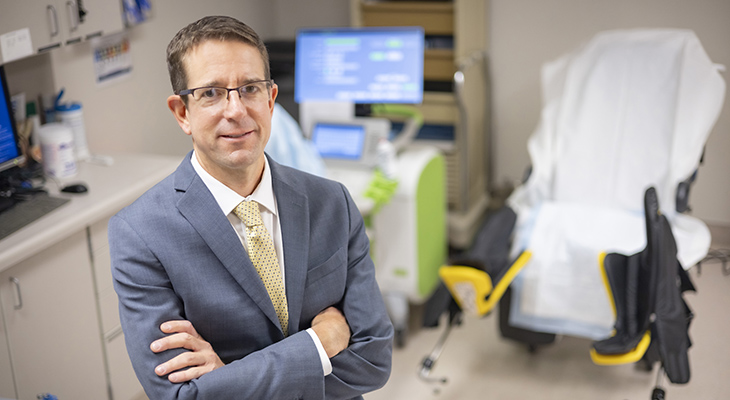UC Davis completes 100th prostate cancer procedure using high-intensity ultrasound
HIFU technique is gaining popularity and becoming more common
UC Davis Comprehensive Cancer Center reached a major milestone by completing its 100th robotic high-intensity focused ultrasound (HIFU) procedure for men with prostate cancer.
“We were the first in the region to offer HIFU and now we are handling one of the highest volumes of HIFU procedures in California,” said UC Davis Health Urologic Surgery Chair Marc Dall’Era.
Performed using the Focal One system, the procedure offers a non-invasive alternative to traditional surgery. Focused ultrasound works like rays of sunlight that pass through a magnifying glass: The energy is concentrated at a single point, to burn just the cancerous cells.
Advantages of HIFU for prostate cancer patients
Because the focused ultrasound waves heat and destroy only part of the prostate while sparing surrounding healthy tissue, there are numerous benefits, including:
- No incisions
- No radiation
- Fewer side effects
- Faster recovery
The outpatient procedure is now available at the new 48X Surgery Complex on the UC Davis Health Sacramento campus. Patients are discharged the same day and return home shortly after the hour-long procedure. They can get back to work within a few days and resume physical activities within a matter of weeks.

Improving access to the latest technologies to treat cancer
“We’re proud to bring this advanced treatment to our community,” Dall’Era said. “It reflects our commitment to offering options that not only treat cancer but also help preserve quality of life for our patients.”
Not everyone is a candidate for HIFU. Men with more aggressive prostate cancer are likely to need conventional treatment that might include radical prostatectomy,radiation and/or chemotherapy.
Other options for patients with slow-growing prostate cancer include watchful waiting or active surveillance.
Ideal candidates for HIFU are prostate cancer patients at intermediate risk that need treatment.
Close monitoring of HIFU patients required
“Patients getting HIFU need to be more carefully monitored because there is a risk of the cancer coming back in the area we treated or a new cancer developing in a different region of the prostate,” Dall’Era explained.
Dall’Era said that’s why his patients are watched closely with PSA testing, follow-up imaging and biopsies conducted for at least a year after treatment.
A recent study of more than 3,000 men treated at 46 centers found that robotic HIFU delivers similar cancer control to traditional prostate surgery, with significantly lower risks of side effects such as incontinence and erectile dysfunction.
To discuss HIFU with an oncology urologist , visit the cancer center webpage and click on Make an Appointment or call 800-2-UCDAVIS.
Related link:
UC Davis Comprehensive Cancer Center
UC Davis Comprehensive Cancer Center is the only National Cancer Institute-designated center serving the Central Valley and inland Northern California, a region of more than 6 million people. Its specialists provide compassionate, comprehensive care for more than 100,000 adults and children every year and access to more than 200 active clinical trials at any given time. Its innovative research program engages more than 240 scientists at UC Davis who work collaboratively to advance discovery of new tools to diagnose and treat cancer. Patients have access to leading-edge care, including immunotherapy and other targeted treatments. Its Office of Community Outreach and Engagement addresses disparities in cancer outcomes across diverse populations, and the cancer center provides comprehensive education and workforce development programs for the next generation of clinicians and scientists. For more information, visit cancer.ucdavis.edu.



